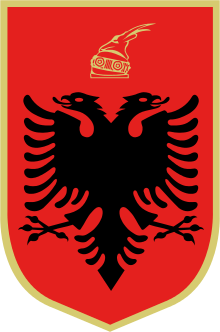Albanian presidential election, 2007
 |
| This article is part of a series on the politics and government of Albania |
|
|
Indirect Albanian presidential elections in 2007 were held on 20 and 27 June,[1] 8 and 11 July,[2] 14 July,[3] and 20 July.[4]
Constitutional provisions
According to the Albanian Constitution the President is elected by the Assembly. A candidate requires three-fifths of the vote in parliament and if no candidate reaches this after five votes there must be new elections to the Assembly; there also have to be early elections if there is no vote on any candidate by the third attempt of the first round of voting.[5]
Early elections
In 2002, Alfred Moisiu was elected as a consensual president and was accepted by both the majority and the opposition parties. The parties would not agree to reelect Moisiu despite his agreement to stand as a compromise candidate. Neither Bamir Topi of the right nor Fatos Nano or Edi Rama of the left had the necessary supermajority in parliament, and therefore it was considered to be very likely that early elections would have to be held after five failed attempts to elect the president.
Current prime minister and former president Sali Berisha had advocated for a president elected by direct popular suffrage, but due to lack of time, such changes could not take place before the 2007 elections.
On 12 July 2007, Rama officially called for early elections.[6] A majority of Albanians were against early elections.
Vote
In the first two attempts for the first round of voting (on 20 June and 27 June), no candidate was presented. On 5 July 2007, the government and the opposition presented their proposed candidate lists, but did not accept either list; they agreed to meet on 6 July 2007 to start another attempt on finding a consensus candidate, which failed. (The opposition had proposed Albania's military representative to NATO, Brig. Gen. Arjan Zaimi, as a compromise candidate, but the government rejected him.) They then set the third attempt of the first round of voting (the first one to actually see any candidate stand for the post) for 8 July. Topi was the official nominee of the ruling coalition, while Nano did not stand as the opposition's candidate (his own party does not support him as a candidate), but de facto as an independent.
First round
The first round of voting on 8 July gave the following results (the opposition boycotted the vote due to the lack of a consensus candidate).[7] [8]
- Bamir Topi: 75 votes
- Fatos Nano: 3 votes
Second round
The second round on 11 July was again boycotted by the opposition and had the following results:[9]
- Bamir Topi: 74 votes (84 votes were necessary to secure the post)
- Fatos Nano: 5 votes
Third round
While the opposition continued its boycott on 14 July in the third round, a new candidate entered the field: Neritan Ceka, the leader of the opposition Democratic Alliance Party. Since he and Topi got the most votes, they proceeded to the fourth round. For the first time, more than the 84 members of parliament necessary for a valid election were present.[10]
- Bamir Topi: 50 votes
- Neritan Ceka: 32 votes
- Fatos Nano: 3 votes
Fourth round
In the fourth and potentially penultimate round on 20 July, 90 parliamentarians were present, including ten from the opposition. The results this time were:
- Bamir Topi: 85 votes
- Neritan Ceka: 5 votes
These surprising results stifled the impending early elections; Topi's election was only possible because five opposition members voted for him instead of Ceka.
References
- ↑ "Albanian parliament to elect president". AP News. 27 June 2007.
- ↑ "Albanian lawmakers fail to elect new president". AP News. 11 July 2007.
- ↑ "Majority of Albanians against early elections". People's Daily Online. July 14, 2007.
- ↑ "Albanian parliament elects Bamir Topi". Sydney Morning Herald. July 21, 2007.
- ↑ Albania PM reshuffles ministers, bolsters coalition
- ↑ People's Daily Online - Albanian opposition asks for early elections
- ↑ "Albanian parliament set to vote for new president". The Associated Press. July 8, 2007.
- ↑ "Albania edges toward elections after presidential vote fails". The Associated Press. July 9, 2007.
- ↑ "Albanian lawmakers fail to elect new president". Associated Press. 11 July 2007.
- ↑ "Albania opposition boycott prevents election of new president in 3rd round". The Associated Press. July 14, 2007.